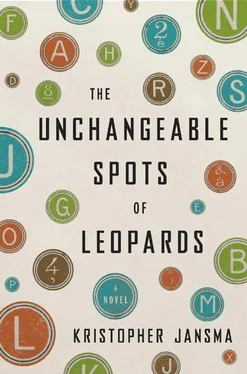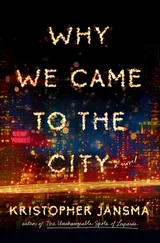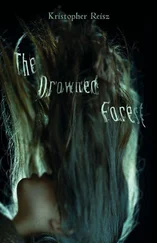I ducked out of the fishing hut and stepped back onto the glacial lake. A few birds were rustling on the far end, and some smoke drifted from a distant chimney. The winter was dead silent. The cell phone barely got any reception, but after a few tries I managed to get a static-filled call through to Rose.
“Anton… darling… there?” she sounded very far away. Static burst on the line.
“It’s me,” I said. “Anton’s going to be fine. Dr. Ivanych cracked the case. He’s been poisoning himself with all that Polish vodka.”
More static. I could not tell if Rose had heard me, so I went on. “Too bad. He was almost the first person to ever die of homesickness.” Was she laughing on the other end?
“How’s the prince?” I asked stiffly, after a moment. More static.
More static. “… he’s well… look let’s not… right now” and more static.
Suddenly it seemed that my whole life was static. Years of garbled nothingness, sitting at a library carrel, letting my imagination do the living. Static. She and I looking after Anton together, but whenever things got hard she went off on auditions. She went off with her princes. And Anton and I would drink and drown our weary ears with fizzing gin and tonics and crackling cubes of ice. Her fiancés were called on and called off like extras in a crowd scene. She and I would drink until our minds snowed over; TV sets tuned to channels that never came in. Static. I’d thought that maybe once she read the novel I’d written for her… But no, it was all wrong. Anton was right. Masterful , she’d said, just like Colette in my story. But then, what had I expected? That was the line I’d written, and she always stuck to the script.
Static. We were always. Stuck.
“I love you,” I said, and, as if the phone knew that these words were not on the approved list, it hissed and burped. “Rose, don’t you know I love you?”
Another burp. And then the call ended. I was alone again on ten acres of frozen water, listening to birds crying in the empty white sky. Had she heard me?
It didn’t matter. If she had, she would pretend that she hadn’t. We’d been there before.
For a minute I thought I might cry, and I wanted the tears to freeze to my eyes and ice them shut. But then I heard a chorus of shouts from the fishing hut.
“Ya spoymal bol’shooyoo riboo! Ogromnaya riba!” The whole framework seemed to be shaking, the bearskin coming to life as the three Russians danced around inside of it.
Spinning on the ice, I tried to slide back toward the tent. It seemed to get only further away from me. Careening on shoes never meant for such surfaces, I collapsed inside the tent just in time to see Dr. Ivanych thrusting the enormous spear down into the hole in the ice, which had doubled in size and seemed to have come alive. Water sprayed up in every direction. Pasha had the line tight in both hands; Anton ducked for cover. With a mighty effort, Dr. Ivanych raised the spear from the water, bringing up with it the biggest fish I’d ever seen. Its scales were black and iridescent, and its eyes opaque. The primeval thing thrashed around in the tiny space. Watery, red blood pumped from its side as it struggled to somehow escape its fate. I was in awe of it. I pitied it. In one moment, it had been the elusive monarch of its frigid kingdom, and in the next, it had been yanked upward into the bright and unbreatheable heavens.
“We’ll feast tonight!” the doctor roared, getting the great, flipping tail above the lip of the hole. With a mighty heave, he launched the fish into an empty corner — only it wasn’t empty. Sitting there on the ice was my yellow hatbox, just inches from the writhing beast, its great gills flapping futilely.
“Get that! Hatbox! Get it!” Anton snapped. Pasha was closest, but he didn’t seem to understand. “Hatbox, hatbox, hatbox!”
I ordered my limbs to move but they were frozen. It happened in a split second. The fish’s powerful tail curled away and then snapped backward, slamming into the box. It shot sideways, into the icy hole and down into the depths of Lake Waccabuc.
And it was gone.
For a moment, no one spoke. Pasha and the doctor were only mildly confused, but Anton was ashen faced. He knew what was inside. He was one of three people who ever would know.
“It’s OK,” I stammered, finding my legs again. “It’s OK. Really.”
Numb, I helped the others lug the dead fish back up to the log cabin. There were other, older drafts. Reworked endings, but none complete. I looked down at the firm, oily tail of the great fish in my hand and felt something strangely like gratitude.
Anton and I watched as Pasha and the doctor laid the fish out on a long workbench. Working in silence, father and son took turns running the blunt edge of a knife all along its silvery length, scraping away the scales to reveal raw pink flesh beneath.
“You were hiding,” Anton said finally. “All that research about how paint was mixed in 1860, and where all the horses were bred, and the history of Manhattan contract law, and… ” He rolled his eyes like he might be sick.
“So…?”
“So you were avoiding the truth,” Anton said. “It was a love story. Hiding in a textbook.”
I knew he was right. I’d built a three-hundred-page house of cards, a carefully balanced illusion, without an ounce of the truth that would cement it in place.
Anton seemed apologetic, but I knew he was being honest. This was why we were friends. This was why I cleaned up the wonton soup bowls and recycled the vodka bottles. It wasn’t about having a trunk full of two-thousand-dollar cans of caviar and an apartment with a view of Union Square. It was about having someone who gave it to you straight when you wanted to be lied to. Staring down into the great yellow globe of the fish’s eye, I said a soft, silent thanks. He had freed me from something I’d been unable to escape for more than a year. Maybe it was about time I picked up an honest trade, became a doctor, or a fisherman, or a dishwasher at Silly Nick’s. Anything but a writer.
We watched as the doctor set down his blunt knife and picked up a longer, much sharper one. As Pasha held the fish steady, the doctor slit open the great beast’s belly from head to tailfin. Anton and I gasped as its mysterious purple innards spilled out onto the bench. Without even thinking of it, I reached over to hold Anton up, getting there before his knees even began to buckle.
“Come on,” I suggested. “Let’s go inside and clean off.”
But though Anton’s face was white as the snow outside, he stayed put. His eyes followed every motion, each slice. As he inhaled the oily stink of the fish, I saw his lips moving slightly, choosing words, testing phrases, timing cadences. He was writing the scene, already. Immediately, I felt my own pulse quickening. I wanted it, too. Here it was — right in front of me, the end of a much better story than the one I had lost. The story of how I’d lost the story.
That night, we ate more caviar — with blinis this time — and we roasted the fish in Dr. Ivanych’s roaring fireplace. The food and fire and vodka soon warmed me. Anton and Pasha spoke of Mother Russia. The doctor told stories about noble fools he and Mr. Prishibeyev had known in the war. Stories about men of God and beautiful peasant women. Stories about fathers and sons and brothers-in-arms. Deep below the ice, my great, terrible novel was still disintegrating in the darkness. Paintbrushes and lovers and gold, coming apart into words and letters and dots.
5. Malice and Desperation in the Grand Canyon
“By God, if I ever cracked, I’d try to make the world crack with me. Listen! The world only exists through your apprehension of it, and so it’s much better to say that it’s not you that’s cracked — it’s the Grand Canyon.”
Читать дальше











